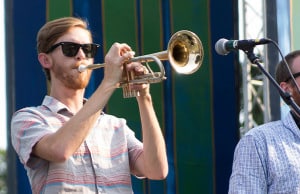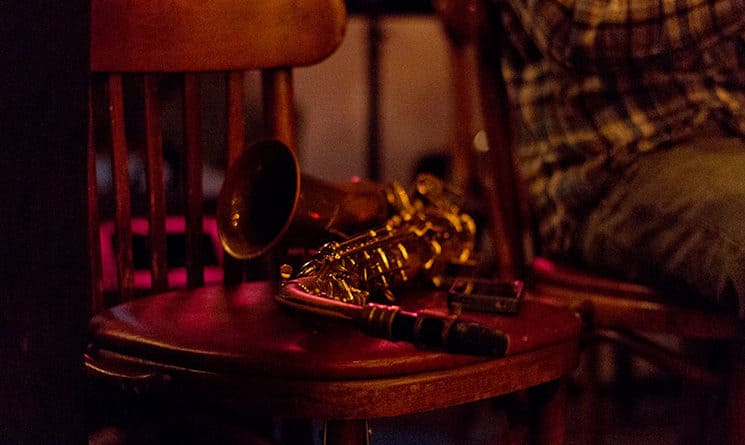When the horn section of a band fires up, something magical happens. If you’ve been out to see any live music in the Seacoast within the last few years, you’ve encountered it. When the trumpets and trombones and saxophones come in to a song, it’s as if some ineffable force fills the room. Reluctant audiences loosen up and start dancing and the room is suddenly a little brighter, a little sharper.
More and more local bands are incorporating horns and horn sections. There are old-school, New Orleans-style jazz bands like the Soggy Po’ Boys, and soul groups like Mother Superior and the Sliding Royales, along with funk bands like Harsh Armadillo, punk bands like A Minor Revolution, and rock bands like Gretchen and the Pickpockets. Horns are back in a big way, and local horn players couldn’t be happier.
Saxophonist Matt Langley says horns have long been a part of the Seacoast’s sound, from Fly Spinach Fly and the jam bands that populated the scene more than a decade ago to bands like Tan Vampires and Mother Superior, in which Langley currently plays.
“I’ve been here since the early ’80s, and there’s been a bunch of horn players who have come and gone,” he says. “There’s a lot of great horn players here right now … and the more great artists that are around, it makes everything so much better.”
Trumpet player Chris Klaxton, who plays in Tan Vampires, Jazzputin and Moe Pope, among others, attributes the newfound prominence of horns to a general trend toward more organic sounds in music.
“It seems like the culture has steered away from guitar-bass-drums format,” he says. “Now, there’s lots of keyboards, synths, and a lot of strings and brass. Texture seems to be making a comeback.”
Locally, he points to the University of New Hampshire, The Press Room, The Stone Church and the former Barley Pub in Dover as all helping foster a “horn culture.”
“In the UNH trumpet studio alone, there were enough success stories that helped push me in this direction,” he says. “(At the Barley Pub), Scott Mason and Rob Boyk were bringing up heavy hitters like Bruce Bartlett, Sam Kininger, and Louis Kato for funk nights.”
There’s also a family element. Klaxton and his brother, saxophonist Eric Klaxton, as well as horn players Nick and Colin Mainella, have been playing together since they were at Timberlane Middle School. Eric Klaxton and Nick and Colin Mainella all play in the Soggy Po’ Boys.
“There’s some form of trumpet that goes back to the biological beginnings of humans.”
Ancient Tones
So why do audiences respond so strongly to horns? Zach Lange, who plays trumpet in the Soggy Po’ Boys, says horns bring “power and dynamic” to a band’s sound. “You can just have a wall of horn sound, and I think the appeal there is that, it can be loud or soft, but it’s organic. It’s not going through an amp or microphone.”
Horns directly connect with the audience — musically, and in other ways. Lange was recently looking for an apartment when a prospective landlord recognized him.
“He said, ‘I know you, you play in the Soggy Po’ Boys.’ I said, ‘Yes,’ and he said, ‘I once saw you in The Press Room and I literally felt your spit come out of the bell of your trumpet and land on my shoe.’ So I apologized, but he said, ‘No, I can’t tell you how awesome it was! It was coming from your lips straight through the trumpet and on to my feet.’”
It’s an extreme example, but there’s something to be said for that kind of direct connection with an artist. Robert Stibler is a professor of music at the University of New Hampshire. His theory about why audiences — and musicians — love to hear horns? It might be in our genes.
“There’s some form of trumpet that goes back to the biological beginnings of humans,” he says. “And the sound of those instruments has always been associated with religion, or magic, or royalty, or the military.”
When Stibler talks about “trumpets,” he’s referring to any kind of horn — from Buddhist trumpets and Jewish shofars to modern trombones and saxophones. And throughout history, horns have been used in war — either to inspire bravery or incite fear among the enemy — in religious ceremonies, and in gathering food.
“They’re always very important for practical reasons,” he says.
That sort of practicality is, in a way, the cornerstone of UNH’s music program. Students who play horns are trained in both jazz and classical styles. The idea, Stibler says, is to prepare musicians so they can pick up almost any job, from playing with a choral group to joining a funk band. That versatility keeps musicians performing, at weddings or concerts or in local bands.
“There’s an unusual saturation of talent here,” Lange says. And though there’s a wealth of horn players in the area, Lange says the scene is collaborative and encouraging. “There’s a common goal,” he says, “and that’s for the Seacoast to be ‘the spot,’ which I think is really special.”


